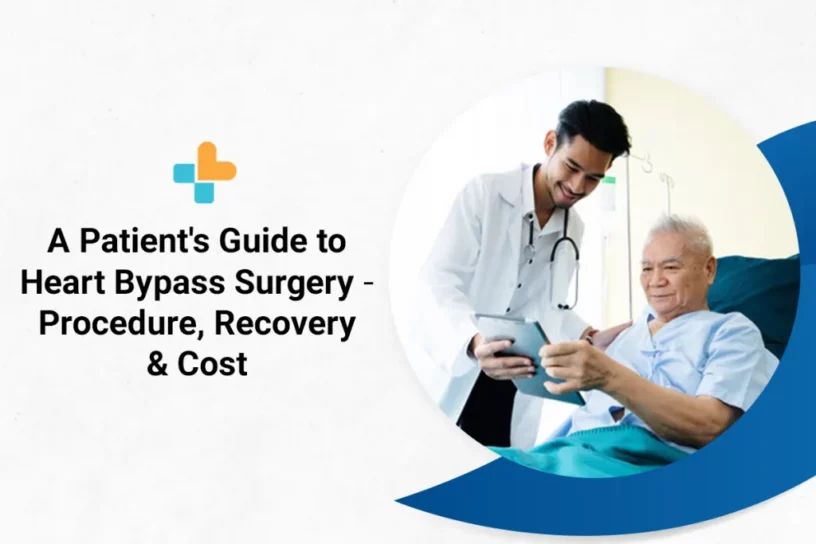
Being nervous before surgery is expected, but it doesn’t have to be scary. The success rate of operations carried out at the right time is 98% or higher. The same applies to bypass surgeries. Do not be concerned if you have been advised to have bypass surgery. Remember that having the operation done at the right time by India’s best heart surgeons will considerably improve your quality of life along with your cardiac health.
Having said that, it is also important that you know certain things before getting into surgery. In this blog, we’ll be going over some important things you need to know about bypass surgery, including its procedure, recovery, and cost.
What is bypass surgery?
Heart bypass surgery, also known as Coronary Artery Bypass Graft (CABG), is a surgical procedure used to treat Coronary Heart Disease (CHD). CHD occurs when the arteries that deliver oxygen-rich blood to your heart muscle (coronary arteries) narrow down due to a gradual build-up of fatty material (atheroma) within their walls.
The surgery involves redirecting blood (bypass) around a constricted section of the artery using a healthy blood vessel (graft) from another part of the body – commonly the chest, leg, or arm – to improve blood and oxygen delivery to the heart muscle.
When do you need bypass surgery?
As mentioned earlier, bypass surgery is used to treat coronary heart diseases. The heart has three major coronary arteries. Fatty deposits can form inside these arteries over time, leading to CHD and reduced blood flow to the heart. When this happens, you may have symptoms like chest pain (angina) and shortness of breath. You’re also more likely to have a heart attack.
For some people, CHD can be treated with medicine and change in lifestyle. However, if the arteries are severely clogged, and if you are not eligible for coronary angioplasty or a stent procedure, heart bypass surgery is recommended. The surgery will help alleviate the symptoms of coronary artery disease and lower the risk of a heart attack.
Benefits of getting a bypass surgery
The procedure has a number of advantages, including those that are especially beneficial to individuals with severe cardiovascular disease.
- It lowers the chance of a heart attack
- Increases quality of life
- Reduces fatigue and shortness of breath
- Makes it easier to perform strenuous activities
- Relieves chest pain (angina)
What does a Bypass procedure involve?
The following are the typical steps that are followed during a coronary bypass surgery ?
- The operation is done under general anesthesia and will last for around three to four hours.
- The surgeon begins by making an incision along the middle of the chest, through the breastbone to reach the heart.
- Then the blood vessels from the arms and/or legs are removed and prepared to act as the new graft.
- If the surgeon is going for an on-pump method, the heart is stopped and the blood is diverted to a heart-lung machine that pumps the blood instead of the heart.
- If the surgeon is following beating heart surgery, then the surgery is performed without stopping the heart.
- The prepared grafts are then used to bypass the narrowed areas in the clogged coronary arteries.
- Once all of the clogged arteries are bypassed and the heart has taken over-pumping (in case of on-pump surgery), the breastbone is securely closed using wires that will stay in place permanently.
- Sutures are used to close the skin on the chest, leg, or arm, where cuts were made to remove blood vessels.
If everything goes according to the surgical plan, you will be kept under observation for one day in the intensive care unit (ICU) and will be recommended to stay at the hospital for another six days.
Recovery from bypass surgery
The recovery period after a bypass varies from person to person. Typically, most people make a full recovery between two to three months after the surgery. Recovery may take longer for people over the age of 80; it’s not uncommon for it to take six months to a year to fully recover.
Cardiac rehabilitation programs are usually offered in the best hospitals in Bangalore, and will normally begin six weeks after you leave the hospital. People who participate in cardiac rehabilitation are more likely to reap the full advantages of their surgery, have a higher quality of life, and require fewer hospitalizations.
It is also important to note that once you’ve fully recovered from the surgery it is very crucial that you make healthy changes to your lifestyle to ensure your long-term health and wellbeing. If you are someone who has other underlying heart diseases, make sure you stay on top of your heart health through regular appointments.
Cost of bypass surgery
The price is defined by the region and clinic where you choose to have your procedure done. Heart bypass surgery is usually covered by health insurance. Out-of-pocket costs for patients with health insurance often include doctor visit co-payments, prescription drug co-payments, and co-insurance.
If you’d like to know what a heart bypass surgery costs in Bangalore’s best hospital- Ayu Health- reach out to us and we’ll give you a cost estimate, with and without an insurance plan. Visit our website to book an appointment or call us at +91 – 6366 100 800 for a consultation.
Our Hospital Locations
Cardiology Surgery Hospitals in Chandigarh | Cardiology Surgery Hospitals in Bangalore | Cardiology Surgery Hospitals in Jaipur | Cardiology Surgery Hospitals in NCR | Cardiology Surgery Hospitals in Hyderabad
Our Doctors
Cardiology Surgery Doctors in Chandigarh | Cardiology Surgery Doctors in Bangalore | Cardiology Surgery Doctors in Jaipur | Cardiology Surgery Doctors in NCR | Cardiology Surgery Doctors in Hyderabad
About the Author

Dr. Magesh Balakrishnan
Dr. Magesh Balakrishnan is a renowned cardiologist currently practicing at Ayu Health, Bangalore.
He has 16 years of experience in this field. He has excellent skills in performing all cardiac diagnostic procedures/ tests. He has performed emergency and elective angiographies and angioplasties, device implantation (Pacemaker, AICD & CRT)




